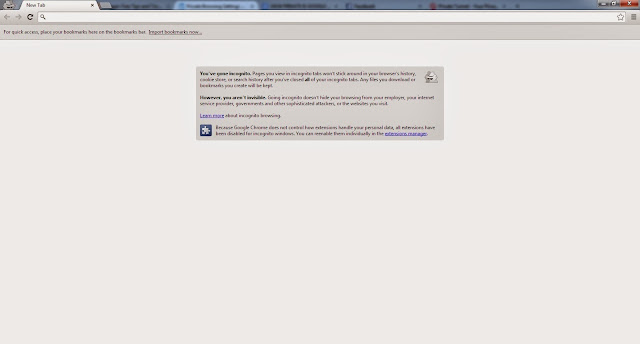How Private is Google's Incongito Mode? | H4Hacky
 |
| How Private is Google's Incongito Mode? | H4Hacky |
With the increase in the number of users of internet globally cyber crimes have also increased remarkably and people should try to be more careful while using the internet than ever before. In the age where almost everyone has access to the internet privacy is one of the most important things that you should worry about while browsing on the internet.
If you are using a public computer for general search like for the schedule of the football world cup fixtures or look for the weather report, privacy is not entirely necessary. But if you are booking a table in a restaurant online, shopping online by using your credit card, checking your bank account, logging into your social media profile or checking your email you need your browsing to be private.
If you are browsing in a public computer you need to be aware that the data you search can easily be accessed by someone else who uses the same computer after you. Mostly people who want their browsing to be private and don’t want anyone to see what they search on the internet remove the history manually after they are done. The traces are removed by clearing the cache and cookie files to completely remove the history. It can also be used specifically for the sites you want to be cleared. They can be removed selectively and the process which does not take much of your time.
Privacy on the internet is now taken very seriously and most modern browsers ship have a private browsing mode that you can be start independently. This helps to avoid keeping the record of the sites visited and the information browsed in that session cannot be restored once the browser is closed.
Private modes of browsing of all the browsers are the same. A new window opens that is independent from the main session. Just like the main session users can open as many sites as they want to open.
There is however a difference between the functioning of Firefox private browsing mode and google chrome's incognito mode.
In google chrome when you close the browser after using the incognito mode the data cannot be restored. Not everyone needs the private mode of browsing as If you search of a website of something that you need and after finding it you close the window than this information that you searched cannot be restored and if you do not remember the exact site that you searched you cannot reopen it as the data is not saved.
But in Firefox this feature is different. In Firefox data can be restored in the same way just like in the normal browser which is by using ctrl+shift-t. It can also be achieved by right click on the tab bar and undo close tabs from the context menu.
Other browser like opera and internet explorer also use private browsing. Opera is chromium based so its private browsing mode is just like that of google chrome’s incognito and the closed tab cannot be restored while internet explorer handles private browsing just like Firefox.
Comparing these browsers and their private browsing a question arises that is why these applications are different in re-opening the tabs once after they are closed. There is no official answer to this but an appropriate and logical reason can be that the browser that can re-open the closed tabs holds data on a window level while the browsers that cannot re-open the closed tabs in incognito mode like google chrome and opera hold data on tab level.
It makes google chrome’s incognito mode more private as there is no restoration of a tab once after it is closed.
Author Bio:
Crack RoBot in as Parental and Tech expert and writer has earned her an exhibited accumulating of readers who are needing for the most recent news and audit about Tech updates.

0 comments:
Post a Comment